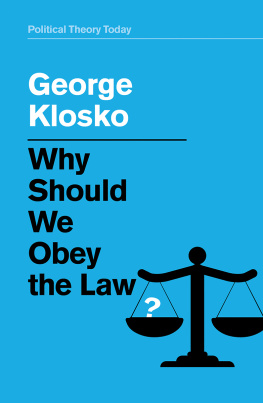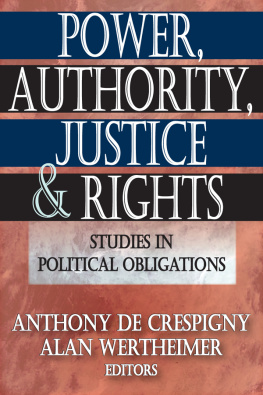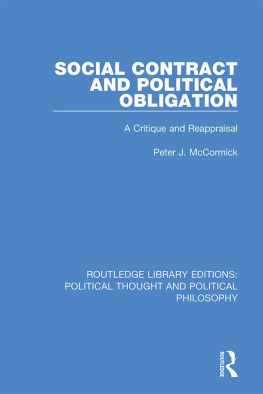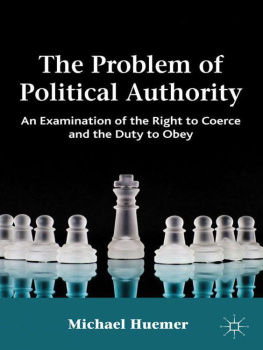Contents
Guide
Pages

Political Theory Today
Janna Thompson, Should Current Generations Make Reparations for Slavery?
Christopher Bertram, Do States Have the Right to Exclude Immigrants?
Diana Coole, Should We Control World Population?
Christopher Finlay, Is Just War Possible?
George Klosko, Why Should We Obey the Law?
Why Should We Obey the Law?
George Klosko
polity
Copyright George Klosko 2019
The right of George Klosko to be identified as Author of this Work has been asserted in accordance with the UK Copyright, Designs and Patents Act 1988.
First published in 2019 by Polity Press
Polity Press
65 Bridge Street
Cambridge CB2 1UR, UK
Polity Press
101 Station Landing
Suite 300
Medford, MA 02155, USA
All rights reserved. Except for the quotation of short passages for the purpose of criticism and review, no part of this publication may be reproduced, stored in a retrieval system or transmitted, in any form or by any means, electronic, mechanical, photocopying, recording or otherwise, without the prior permission of the publisher.
ISBN-13: 978-1-5095-2124-1
A catalogue record for this book is available from the British Library.
Library of Congress Cataloging-in-Publication Data
Names: Klosko, George, author.
Title: Why should we obey the law? / George Klosko.
Description: Cambridge, UK ; Medford, MA, USA : Polity Press, 2018. | Series: Political theory today | Includes bibliographical references and index.
Identifiers: LCCN 2018019543 (print) | LCCN 2018034583 (ebook) | ISBN 9781509521241 (Epub) | ISBN 9781509521203 (hardback) | ISBN 9781509521210 (pb)
Subjects: LCSH: Obedience (Law) | Political obligation. | Law--Philosophy.
Classification: LCC K250 (ebook) | LCC K250 .K56 2018 (print) | DDC 323.6/5--dc23
LC record available at https://lccn.loc.gov/2018019543
The publisher has used its best endeavours to ensure that the URLs for external websites referred to in this book are correct and active at the time of going to press. However, the publisher has no responsibility for the websites and can make no guarantee that a site will remain live or that the content is or will remain appropriate.
Every effort has been made to trace all copyright holders, but if any have been inadvertently overlooked the publisher will be pleased to include any necessary credits in any subsequent reprint or edition.
For further information on Polity, visit our website: politybooks.com
Acknowledgments
I have been working on questions of political obligation since the mid-1980s. I am grateful to the many colleagues and friends with whom I have discussed the subject and the many audiences to whom I have presented material. I am also indebted to the students in classes on political obligation that I have taught. Although I will not attempt to recount all the personal debts I have accumulated over the years, I should note John Simmons, whose work prompted my first interest in the subject, and, along with that of other scholars many of whom are listed in the references has been a continuing source of inspiration. At Polity I am grateful to the anonymous readers of my initial prospectus, and of the complete manuscript. My editor, George Owers, has been immensely helpful throughout, and I would like to thank Justin Dyer for excellent copy-editing.
Much of the material in this work is based on my previous publications, some of which are listed in the references. Given length limitations for books in this series, I am unable to present detailed arguments for many positions I defend. These are in the main found in my previous work. In a few places, I draw directly on previous publications. Material from draws on Multiple Principles of Political Obligation, Political Theory, 32 (2004), 80124. I am grateful to the publishers for permission to use material from these pieces here.
As ever I am grateful to my wife, Meg, my daughters, Caroline, Susanna, and Deborah, and my grandson, Manny, for moral support.
For my fellow scholars who work on political obligation.
Introduction
You are walking down the street. A gunman points a pistol at you, and demands that you turn over your wallet. Chances are you will comply. In such a case, it is clear that you are obliged to surrender your wallet. By this, we mean that the consequences of not doing so are sufficiently unpleasant to elicit your cooperation. Consider an alternative case. Your government institutes an income tax and demands that you pay it. In this case too, chances are that you will comply. Your government has the means to force you to pay and to punish you if you do not. In this case too, you are obliged to cooperate. But this case differs in a fundamental way. If you are a citizen of the relevant state or perhaps an inhabitant of the relevant country it may well be that you should comply, that, unlike with the gunman, it is right that you do so. Put a bit differently, in this case, your government has a moral claim that you obey its commands. If this is true, then you are not only obliged to obey but also have an obligation to. If paying taxes is the law of the land, then you should obey the law and pay your taxes (see Hart 1961, 808).
The subject of this book, as indicated in its title, is reasons why people should obey their governments, or obey the law. The two examples in the previous paragraph differ in regard to the non-existence or existence of a moral basis for obedience. Our main questions concern the nature of this moral claim.
Political obligation, as the subject is generally referred to, is a practical topic that affects all of us and throughout our lives. Governments are constantly making laws and demanding that people obey. Confronted with a particular tax, the selfconscious citizen should ask herself whether she should pay it. The laws requirement that she do so is a factor in her practical reasoning, to be weighed against and considered along with others. The laws demands may be relatively trivial: to cross the street only at the crosswalk, or to wait for the walk sign before crossing. But far more onerous demands are possible: to pay income taxes that can amount to a substantial portion of ones earnings; in the extreme case, to provide military service that could cost ones life. In these and other instances, governments have means to enforce compliance. Ordinarily, the citizen will be obliged to comply. But once again, we should inquire into reasons that could make it right for her to do so. This large question encompasses numerous sub-questions: why a government has a right to its subjects obedience; over whom such a right holds; when it holds and when it ceases to hold; the circumstances responsible for the latter; ones recourse if one is no longer obligated to obey; and many others. These questions have been central to political philosophy since the origin of the discipline. Greater and lesser thinkers have discussed them endlessly, from different perspectives, coming to sharply different conclusions. At the present time, scholars disagree, and consensus is not in sight. But, once again, these are questions with which all of us must deal, and I will attempt to provide answers. Given disagreements between scholars, I do not expect these answers to meet with general or perhaps even widespread acceptance. But I will attempt to present a plausible position although one that also differs in important ways from many others in the literature.
In ordinary discourse, an obligation is a moral requirement that someone imposes on herself. If I promise you to take you to the movies, this requirement, created by the promise, is binding on me because I made it. Presumably, had I not made the promise, I would not have an obligation to take you. However, the term obligation may be used in a broader sense, in which it is roughly equivalent to duty, with both terms referring to moral requirements that may or may not be self-imposed. Accordingly, the term political obligation is also used in a somewhat broad sense, denoting moral requirements to obey the law, whether or not they are self-imposed. Moral requirements to obey the law can have different bases. What I view as the most important will be discussed below.












